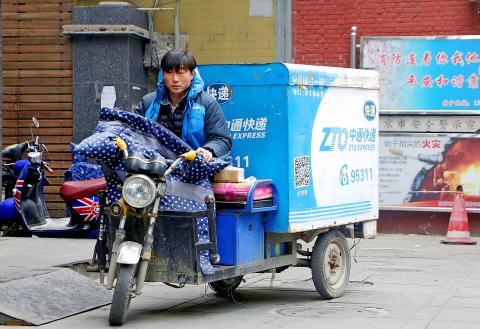Chinese package delivery company ZTO Express Inc (中通快遞) on Wednesday said it raised US$1.4 billion in the biggest US initial public offering (IPO) of the year as its backers cashed in on China’s booming online-shopping industry.
The stock market debut, the biggest by a Chinese company since the US$25 billion IPO of e-commerce giant Alibaba Group Holding Ltd (阿里巴巴)in 2014, gave the Shanghai-based company a market value of more than US$12 billion.
ZTO’s US listing is a head start over rivals in the world’s largest express delivery market because it gives the company faster access to cash to expand.

Photo: Reuters
The company wants to use US$720 million of its IPO proceeds to buy more trucks, land, facilities and equipment.
Its Chinese competitors SF Express (順豐速運), YTO Express (圓通速遞), STO Express (申通快遞) and Yunda Express (韻達快遞) have all unveiled plans for listings in Shenzhen and Shanghai, but with a backlog of about 800 companies waiting for approval to go public in China and frequent changes to the rules, a New York listing is regarded as a quicker and more reliable way of raising funds and tapping a broader mix of investors.
ZTO’s existing shareholders, including private equity firms Warburg Pincus LLC, Hillhouse Capital Management (高瓴資本管理) and venture capital firm Sequoia Capital (紅杉資本), will also get much more leeway and flexibility to exit their investment under US market rules.
In China, they would be locked in for one to three years after the IPO.
ZTO priced 72.1 million shares at US$19.50 a share, above its previously indicated range of US$16.50 to US$18.50 a share.
That price is about 27 times its expected earnings per share for next year, according to people familiar with the company’s financials.
US rivals, United Parcel Service Inc and FedEx Corp, which are growing at a much slower pace, are trading at multiples of 17.8 and 13.4 times expected next year’s earnings.
As concerns grow about a weakening Chinese currency, the New York IPO also gives the company more stable US dollar-denominated shares it can use for international acquisitions, according to people close to the company.
China’s express delivery firms handled 20.7 billion parcels last year, shifting 1.5 times the volume moved in the US, according to consulting firm iResearch data cited in the ZTO prospectus.

DIVIDED VIEWS: Although the Fed agreed on holding rates steady, some officials see no rate cuts for this year, while 10 policymakers foresee two or more cuts There are a lot of unknowns about the outlook for the economy and interest rates, but US Federal Reserve Chair Jerome Powell signaled at least one thing seems certain: Higher prices are coming. Fed policymakers voted unanimously to hold interest rates steady at a range of 4.25 percent to 4.50 percent for a fourth straight meeting on Wednesday, as they await clarity on whether tariffs would leave a one-time or more lasting mark on inflation. Powell said it is still unclear how much of the bill would fall on the shoulders of consumers, but he expects to learn more about tariffs

Meta Platforms Inc offered US$100 million bonuses to OpenAI employees in an unsuccessful bid to poach the ChatGPT maker’s talent and strengthen its own generative artificial intelligence (AI) teams, OpenAI CEO Sam Altman has said. Facebook’s parent company — a competitor of OpenAI — also offered “giant” annual salaries exceeding US$100 million to OpenAI staffers, Altman said in an interview on the Uncapped with Jack Altman podcast released on Tuesday. “It is crazy,” Sam Altman told his brother Jack in the interview. “I’m really happy that at least so far none of our best people have decided to take them

PLANS: MSI is also planning to upgrade its service center in the Netherlands Micro-Star International Co (MSI, 微星) yesterday said it plans to set up a server assembly line at its Poland service center this year at the earliest. The computer and peripherals manufacturer expects that the new server assembly line would shorten transportation times in shipments to European countries, a company spokesperson told the Taipei Times by telephone. MSI manufactures motherboards, graphics cards, notebook computers, servers, optical storage devices and communication devices. The company operates plants in Taiwan and China, and runs a global network of service centers. The company is also considering upgrading its service center in the Netherlands into a

NOT JUSTIFIED: The bank’s governor said there would only be a rate cut if inflation falls below 1.5% and economic conditions deteriorate, which have not been detected The central bank yesterday kept its key interest rates unchanged for a fifth consecutive quarter, aligning with market expectations, while slightly lowering its inflation outlook amid signs of cooling price pressures. The move came after the US Federal Reserve held rates steady overnight, despite pressure from US President Donald Trump to cut borrowing costs. Central bank board members unanimously voted to maintain the discount rate at 2 percent, the secured loan rate at 2.375 percent and the overnight lending rate at 4.25 percent. “We consider the policy decision appropriate, although it suggests tightening leaning after factoring in slackening inflation and stable GDP growth,”